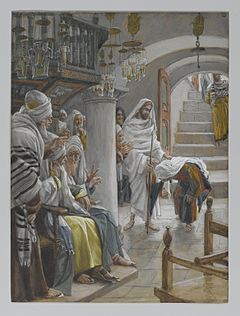Now he was teaching in one of the synagogues on the sabbath.
And just then there appeared a woman with a spirit that had crippled
her for eighteen years. She was bent over and was quite unable to
stand up straight. When Jesus saw her, he called her over and said,
‘Woman, you are set free from your ailment.’ When he laid his
hands on her, immediately she stood up straight and began praising
God. But the leader of the synagogue, indignant because Jesus had
cured on the sabbath, kept saying to the crowd, ‘There are six days
on which work ought to be done; come on those days and be cured, and
not on the sabbath day.’ But the Lord answered him and said, ‘You
hypocrites! Does not each of you on the sabbath untie his ox or his
donkey from the manger, and lead it away to give it water? And ought
not this woman, a daughter of Abraham whom Satan bound for eighteen
long years, be set free from this bondage on the sabbath day?’ When
he said this, all his opponents were put to shame; and the entire
crowd was rejoicing at all the wonderful things that he was doing.
(Luke 13:10-17)
Here's
a parallel parable:
Mrs.
Johnson was a good woman. She was in church every Sunday and could
always be counted on to assist with dinners and charity events. She
had been the faithful wife of Walter for thirty years, raised her son
(who lived in the family basement) and a daughter. Unfortunately,
Mrs. Johnson's daughter suffered from substance abuse issues, and
Mrs. J. often had to look after a six-year-old granddaughter herself.
Additionally, this good woman cared for her aging mother who insisted
on living alone, and held down a part-time job as a bookkeeper for a
local construction firm. Her friends loved and trusted her, and
frequently consulted her when they had problems in their own lives.
One
day, the good Mrs. Johnson announced that she was divorcing her
husband on the grounds of his chronic intemperance and habitual
verbal abuse. She also told her nineteen-year-old son that he had
three weeks to get a job and move out of her home. She told her
daughter that she would no longer bail her out of jams, open her home
to her, or give her any money or support unless she agreed to go into
rehab immediately and stay clean for at least a year. She admitted to
an addiction to over-the-counter sleeping pills, filed for
disability, and quit her job at the construction company. She then
informed all of her friends that she would not be taking their phone
calls if they insisted on burdening her with their problems. Finally,
over much objection and emotional blackmail, Mrs. Johnson had her
aging mother placed in an assisted living facility.
So is
Mrs. Johnson still a good woman?
If
you answered “yes” to the above question, there is an excellent
chance that you are behaving like a Christian.
I
don't know what kind of medical diagnosis applies to the woman in the
gospel lesson from last Sunday (Luke 13:10-17, above), but I know
that there are all kinds of spirits which can cripple us and keep us
bowed over in a perpetual state of pain—emotional as well as
physical. The woman in the story doesn't ask for Jesus' help. She
just piously comes to the place of prayer on the sabbath because—for
all the spirits which cripple her—she still knows that she is a
daughter of Abraham and the heir of God's love and favor. And Jesus
does not wait for her to apply for healing. He knows that it's not
God's will that this woman—or anyone else for that matter—should
suffer from pain and oppression.
Unfortunately,
the leader of the synagogue doesn't get it. Let's forget for the
moment that this guy is probably crazy jealous because a hick
preacher from the hick town of Nazareth has just shown him up by
performing a miraculous act of spiritual healing. We're all awfully
good at coming up with pious reasons to mask our most ignoble
inclinations. The leader supposedly is “indignant” that sabbath
observances have been ignored. He's turned virtue into an
idolatry—the same sort of attitude that keeps all the Mrs. Johnsons
in this world bowed over in bondage.
Jesus
calls the Church to lift the yokes. And if we don't know how to lift
the burden, the very least we can do is refrain from judging those
who are carrying it.
If you remove the yoke from among you,
the pointing of the finger, the speaking of evil,
if you offer your food to the hungry
and satisfy the needs of the afflicted,
then your light shall rise in the darkness
and your gloom be like the noonday. (Isaiah 58:9b-10)
the pointing of the finger, the speaking of evil,
if you offer your food to the hungry
and satisfy the needs of the afflicted,
then your light shall rise in the darkness
and your gloom be like the noonday. (Isaiah 58:9b-10)
Thanks
for dropping by, my friends! As always, your comments are
appreciated.
(PS-Yup, I'm still
trying to get signatures on my petition to ask Pope Francis to let
Lutherans and Roman Catholics share Holy Communion. Do I think it
will do any good? Probably not, but hey..! We've got another four
years to go before the 500th anniversary of the Protestant
Reformation. If nothing else, we can start the conversation. A lot
can happen in the next four years, and this new pope looks like a
pretty cool guy. Let's give it a shot. Just click here.

No comments:
Post a Comment